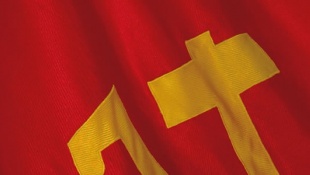Translated "Avante" article by Ângelo Alves, Member of the PCP Political Committee and of the International Department
France’s regional second round elections, closes up two week-ends of electoral acts within two important European countries: in Spain, in Andalusia and in France. The electoral cycle, which begun with the Greek elections and ought to carry on throughout the current year and the next, holds a significant political importance, by allowing to understand and see which are the European Union crisis expressions and the bourgeois representation systems and ought to certainly prove the signals on context trends, which mark the political situation in Europe, namely on the deep social-democracy crisis and the growing populism and right-wing.
The French regional elections registered an almost 50% abstention, and are marked by a major turn to the right-wing, within the French political panorama. Sarkozy’s UMP and Marie Le Pen’s National Front, together, add up 67,5% of votes. The right-wing achieves 22,3% of the votes, although it did not achieve to win a single department in the second round, having been placed behind the Left-Wing Front ( integrated by the FCP) in terms of elected members .The main reason of these results is the François Hollande Socialist Party resounding defeat, the government’s party, which looses almost half of the departments for the UMP. Sarkozy’s revanche together with the Far Right-Wing consolidation, are facts which raise two important questions: the first, is the French socialist party role, in other words, the social-democracy, which created enormous expectations round the “change” slogan, during the presidential elections in 2012, and during the mandate exercise , not but only pursued but deepened policies which had been heavily criticized during the electoral campaign. The disillusion towards social democracy always favours the right-wing. And, in this case, the far right-wing. The second question, is a reflex from the European Union policies, which create the conditions, so that a force like the National Front not only finds the space to develop its reactionary nationalist speech as, in its absence, on the left, rupture clear and coherent proposals towards the European Union pillars and the national sovereignty defence, collects the protest votes together with the EU policies and guidelines.
The Andalusia outcome confirms another direction within this electoral cycle: the parties in power penalization, which perform the anti-social attack against workers’ dignity. The PP suffers a hard defeat in Andalusia, having lost half a million votes. But, on confirming Spain’s social democracy crisis, the PSOE wins the elections, although loosing votes and decreasing more than 4%. Here one finds a difference concerning France. In Spain and Andalucía, the safety valve weight and social-democracy reconstitution, has a significant role, not as much as expected. The Podemos, which the polls considered one of the strongest parties in Spain, achieves 15% of the votes, whilst another similar party, the Ciudadanos, achieves 9%.
What both elections confirm is that the social situation is hard, class collision is so strong, that in conscience, the progressive popular rejection of a same policy holding two faces, the system attempts to find the most diverse forms so that no real alternatives towards that policy might be achieved. Both by opening the way to the right-wing, and promoting forces, that once presented as “new” and of “unity” nature, end up to be affirmed as political cushions and social-democracy’s restructuring spaces. The answer ought to be but one: to clearly affirm the need of ruptures, denouncing the diversion manoeuvres that will multiply, intensify the ideological combat and build unity amid the people.


